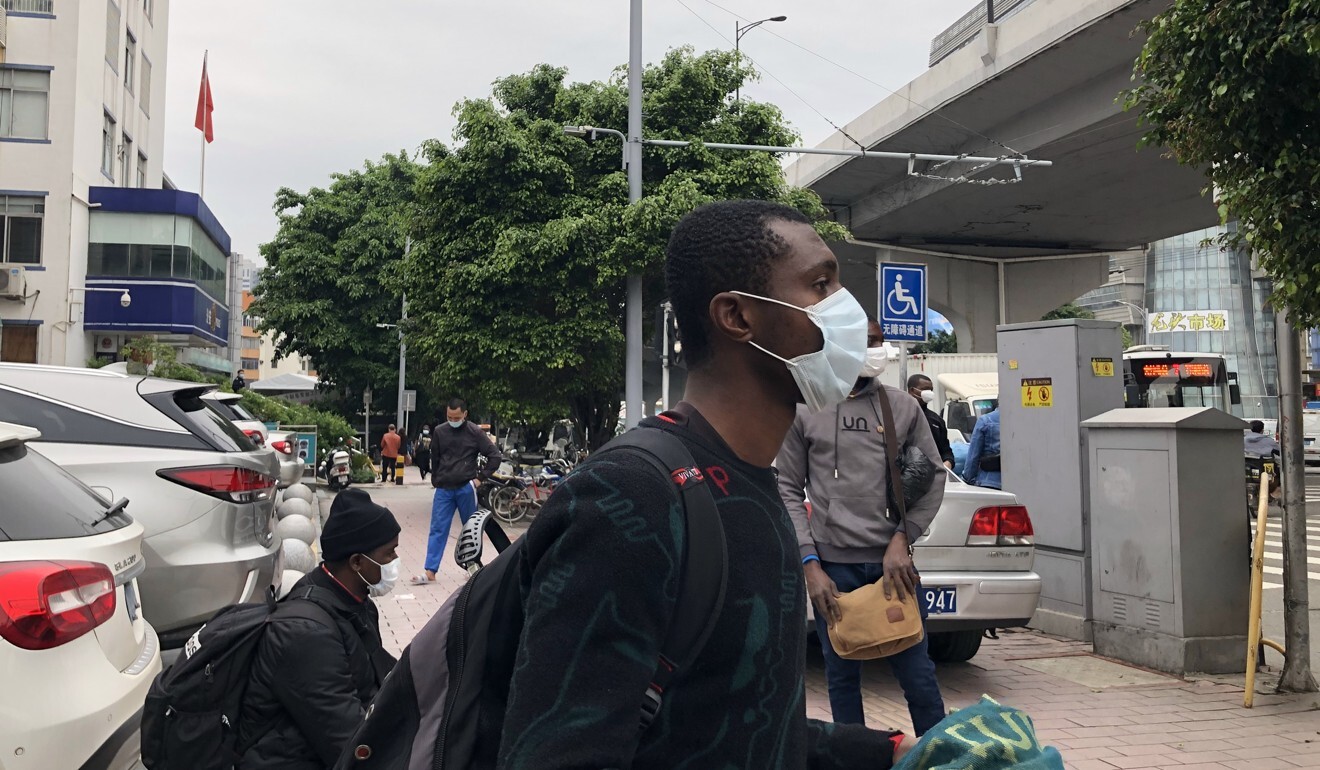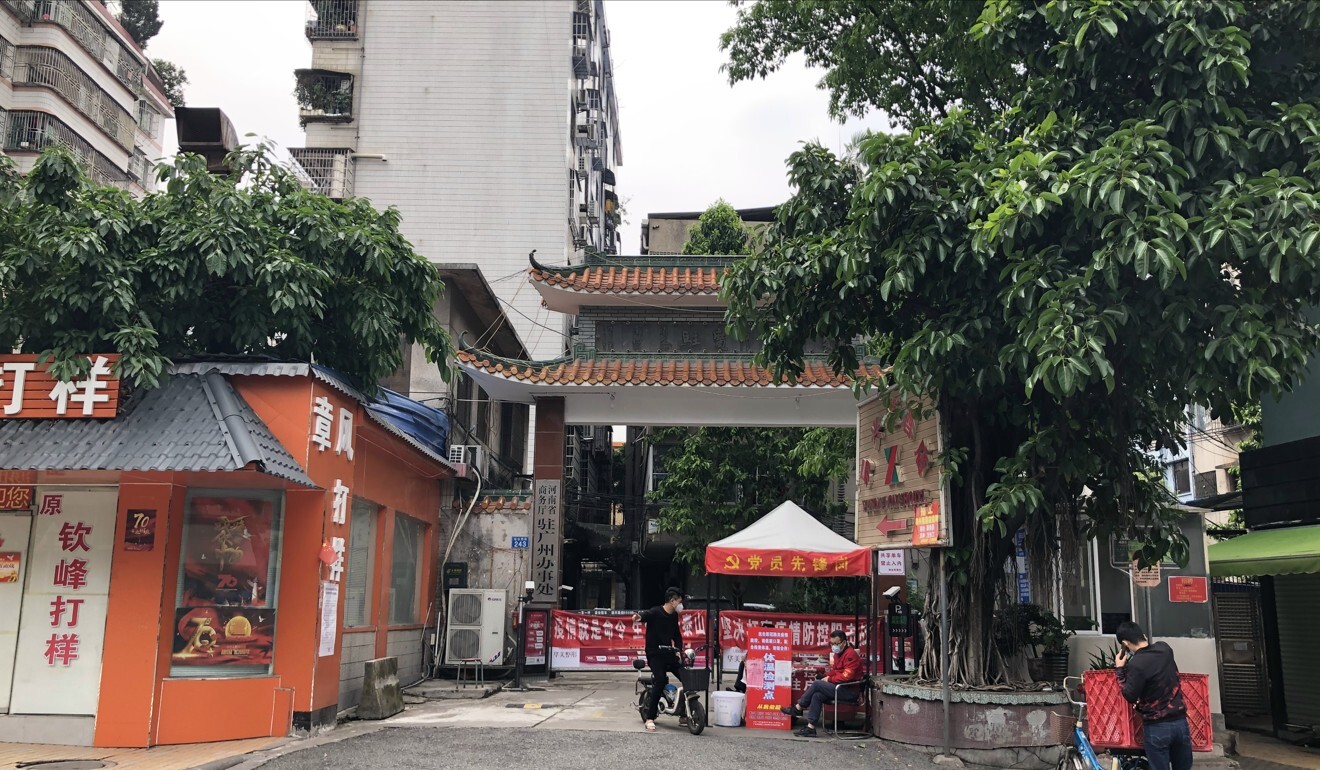Coronavirus: Guangzhou cases prompt shutdown in ‘Little Africa’ trading hub
- Authorities say five Nigerians test positive for Covid-19, four of whom were frequent visitors to a restaurant in the area
- Nigerian trader says he cannot find anywhere to stay after completing two weeks of quarantine

Authorities in the southern Chinese city of Guangzhou are investigating a possible series of community transmissions of coronavirus in its “Little Africa” district after five Nigerians who tested positive were linked to a city restaurant.
The infections, centred on Kuangquan Street in Yuexiu district, has raised an alarm in a city that has so far reported only 463 cases of Covid-19, the disease caused by the coronavirus.
Guangzhou officials reported on Tuesday that the city had 111 imported cases of Covid-19 including at least 16 patients from various countries in Africa.
According to the officials, 10 Covid-19 patients including the five Nigerians could be linked to Kuangquan Street, prompting the authorities to impose stringent control measures for all people entering and leaving the area.
Chinese health officials have warned the country to be on guard against imported cases from countries like Britain and Italy but also from areas with less-developed health systems.
Ouyang Ziwen, deputy director of the Guangzhou Health Commission, said on Tuesday that four of the five Nigerians who tested positive regularly visited the Emma Food restaurant on Kuangquan Street, which has since been closed for inspection.
He said that as part of general efforts to contain the coronavirus pandemic, Guangzhou screened 3,779 foreigners from high-risk countries who had not been under centralised quarantine.
The five Nigerians were detected in this process and put under isolation.
Guangzhou is a major trading and garment industry hub, attracting many merchants from around the world, including Africa.
Kuangquan Street is close to a number of international markets that had reopened for business in March.
But on Tuesday, security guards were stationed at entries to the street to check any visitors’ temperature before admission, measures that residents said had been in place since Saturday.
“All shops have been closed since April 4 and I have heard that the closure will last for 14 days,” a cleaner said.
“Normally, there are a lot of African people but now they have been shut out.”
Henry Odini, 27, who arrived from Nigeria on March 20 on his first trip to Guangzhou, said he had just completed 14 days of quarantine at a hotel and could not find anywhere to stay.
“I just paid 3,556 yuan (US$500) for the hotel where I stayed for the 14 days of quarantine,” Odini said. “But now, no hotel will take me.
“It’s my first time to come to China. Many friends and relatives have earned a lot of money so I had planned to come and buy clothes, shoes and then sell them in Nigeria. Now the only thing I want is to go home but there are no flights.”

A security guard at the nearby Longtou market said that from Tuesday “only Chinese people with a certificate to say they are healthy can enter the market”.
Half of the shops on Kuangquan Street were vacant and residents said business was poor.
“The business is really bad because of the coronavirus outbreak. If you want to rent [a shop], better think twice. At least wait for two weeks, see what happens, see whether the business can reopen then,” one shop assistant said.
Wang Xinhua, president of Guangzhou Medical University, said the cases in the African community “are just sporadic, not leading to a new outbreak”.
“Now we have implemented forceful border control measures including isolation and carrying out nucleic [tests for suspected patients]. So as long as we don’t lower our guard, the situation is still preventable and controllable,” Wang said.

Liang Yucheng, a sociologist at Guangzhou’s Sun Yat-sen University, said he was optimistic that situation would improve for the African community in the city.
“I think a megacity like Guangzhou has the capacity to deal [with] as many as 100 cases every day. The authorities can control the situation through the comprehensive epidemiological investigation. So the public should not panic,” Liang said.
He said he felt sorry for visitors like Odini who were stranded in the city but he believed that “the government will eventually sort things out”.
According to a report by Guangzhou police, about 11,000 Africans were living and working in the city in 2017.
Sign up now and get a 10% discount (original price US$400) off the China AI Report 2020 by SCMP Research. Learn about the AI ambitions of Alibaba, Baidu & JD.com through our in-depth case studies, and explore new applications of AI across industries. The report also includes exclusive access to webinars to interact with C-level executives from leading China AI companies (via live Q&A sessions). Offer valid until 31 May 2020.